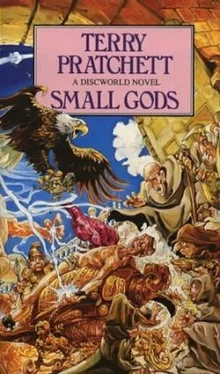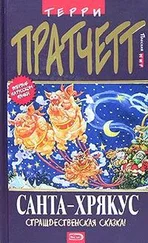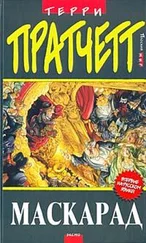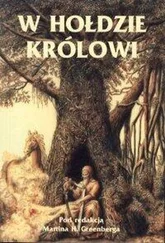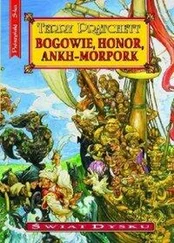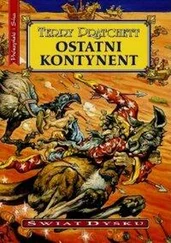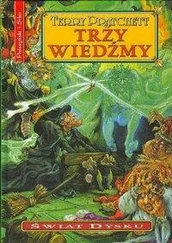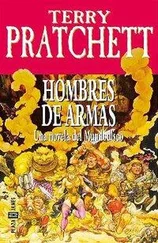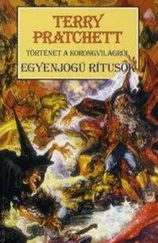Terry Pratchett - Small Gods
Здесь есть возможность читать онлайн «Terry Pratchett - Small Gods» весь текст электронной книги совершенно бесплатно (целиком полную версию без сокращений). В некоторых случаях можно слушать аудио, скачать через торрент в формате fb2 и присутствует краткое содержание. Жанр: Юмористическая фантастика, на английском языке. Описание произведения, (предисловие) а так же отзывы посетителей доступны на портале библиотеки ЛибКат.
- Название:Small Gods
- Автор:
- Жанр:
- Год:неизвестен
- ISBN:нет данных
- Рейтинг книги:4 / 5. Голосов: 1
-
Избранное:Добавить в избранное
- Отзывы:
-
Ваша оценка:
- 80
- 1
- 2
- 3
- 4
- 5
Small Gods: краткое содержание, описание и аннотация
Предлагаем к чтению аннотацию, описание, краткое содержание или предисловие (зависит от того, что написал сам автор книги «Small Gods»). Если вы не нашли необходимую информацию о книге — напишите в комментариях, мы постараемся отыскать её.
Small Gods — читать онлайн бесплатно полную книгу (весь текст) целиком
Ниже представлен текст книги, разбитый по страницам. Система сохранения места последней прочитанной страницы, позволяет с удобством читать онлайн бесплатно книгу «Small Gods», без необходимости каждый раз заново искать на чём Вы остановились. Поставьте закладку, и сможете в любой момент перейти на страницу, на которой закончили чтение.
Интервал:
Закладка:
"You call that a thunderbolt?"
Brutha was red in the face, and shaking. The tortoise hung its head sadly.
"All right. All right. Not much of one, I admit," it said. "If I was better, you'd have been just a pair of sandals with smoke coming out." It looked wretched. "I don't understand it. This sort of thing has never happened to me before. I intended to be a great big roaring white bull for a week and ended up a tortoise for three years. Why? I don't know, and I'm supposed to know everything. According to these prophets of yours who say they've met me, anyway. You know, no one even heard me? I tried talking to goatherds and stuff, and they never took any notice! I was beginning to think I was a tortoise dreaming about being a god. That's how bad it was getting."
"Perhaps you are," said Brutha.
"Your legs to swell to tree trunks!" snapped the tortoise.
"But-but," said Brutha, "you're saying the prophets were . . . just men who wrote things down! "
"That's what they were!"
"Yes, but it wasn't from you!"
"Some of it was, perhaps," said the tortoise. "I've . . . forgotten so much, the past few years."
"But if you've been down here as a tortoise, who's been listening to the prayers? Who has been accepting the sacrifices? Who has been judging the dead?"
"I don't know," said the tortoise. "Who did it before?"
"You did!"
"Did I?"
Brutha stuck his fingers in his ears and opened up with the third verse of Lo, the infidels flee the wrath of Om.
After a couple of minutes the tortoise stuck its head out from under its shell.
"So," it said, "before unbelievers get burned alive . . . do you sing to them first?"
"No!"
"Ah. A merciful death. Can I say something?"
"If you try to tempt my faith one more time-”
The tortoise paused. Om searched his fading memory. Then he scratched in the dust with a claw.
"I . . . remember a day . . . summer day . . . you were . . . thirteen . . ."
The dry little voice droned on. Brutha's mouth formed a slowly widening O.
Finally he said, "How did you know that?"
"You believe the Great God Om watches everything you do, don't you?"
"You're a tortoise, you couldn't have-”
"When you were almost fourteen, and your grandmother had beaten you for stealing cream from the stillroom, which in fact you had not done, she locked you in your room and you said, 'I wish you were-' "
There will be a sign, thought Vorbis. There was always a sign, for the man who watched for them. A wise man always put himself in the path of the God.
He strolled through the Citadel. He always made a point of taking a daily walk through some of the lower levels, although of course always at a different time, and via a different route. Insofar as Vorbis got any pleasure in life, at least in any way that could be recognized by a normal human being, it was in seeing the faces of humble members of the clergy as they rounded a corner and found themselves face-to-chin with Deacon Vorbis of the Quisition. There was always that little intake of breath that indicated a guilty conscience. Vorbis liked to see properly guilty consciences. That was what consciences were for. Guilt was the grease in which the wheels of the authority turned.
He rounded a corner and saw, scratched crudely on the wall opposite, a rough oval with four crude legs and even cruder head and tail.
He smiled. There seemed to be more of them lately. Let heresy fester, let it come to the surface like a boil. Vorbis knew how to wield the lance.
But the second or two of reflection had made him walk past a turning and, instead, he stepped out into the sunshine.
He was momentarily lost, for all his knowledge of the byways of the church. This was one of the walled gardens. Around a fine stand of tall decorative Klatchian corn, bean vines raised red and white blossoms towards the sun; in between the bean rows, melons baked gently on the dusty soil. In the normal way, Vorbis would have noted and approved of this efficient use of space, but in the normal way he wouldn't have encountered a plump young novice, rolling back and forth in the dust with his fingers in his ears.
Vorbis stared down at him. Then he prodded Brutha with his sandal.
"What ails you, my son?"
Brutha opened his eyes.
There weren't many superior members of the hierarchy he could recognize. Even the Cenobiarch was a distant blob in the crowd. But everyone recognized Vorbis the exquisitor. Something about him projected itself on your conscience within a few days of your arrival at the Citadel. The God was merely to be feared in the perfunctory ways of habit, but Vorbis was dreaded.
Brutha fainted.
"How very strange," said Vorbis.
A hissing noise made him look round.
There was a small tortoise near his foot. As he glared, it tried to back away, and all the time it was staring at him and hissing like a kettle.
He picked it up and examined it carefully, turning it over and over in his hands. Then he looked around the walled garden until he found a spot in full sunshine, and put the reptile down, on its back. After a moment's thought he took a couple of pebbles from one of the vegetable beds and wedged them under the shell so that the creature's movement wouldn't tip it over.
Vorbis believed that no opportunity to acquire esoteric knowledge should ever be lost, and made a mental note to come back again in a few hours to see how it was getting on, if work permitted.
Then he turned his attention to Brutha.
There was a hell for blasphemers. There was a hell for the disputers of rightful authority. There were a number of hells for liars. There was probably a hell for little boys who wished their grandmothers were dead. There were more than enough hells to go around.
This was the definition of eternity; it was the space of time devised by the Great God Om to ensure that everyone got the punishment that was due to them.
The Omnians had a great many hells.
Currently, Brutha was going through all of them.
Brother Nhumrod and Brother Vorbis looked down at him, tossing and turning on his bed like a beached whale.
"It's the sun," said Nhumrod, almost calm now after the initial shock of having the exquisitor come looking for him. "The poor lad works all day in that garden. It was bound to happen."
"Have you tried beating him?" said Brother Vorbis.
"I'm sorry to say that beating young Brutha is like trying to flog a mattress," said Nhumrod. "He says `ow!' but I think it's only because he wants to show he's willing. Very willing lad, Brutha. He's the one I told you about."
"He doesn't look very sharp," said Vorbis.
"He's not," said Nhumrod.
Vorbis nodded approvingly. Undue intelligence in a novice was a mixed blessing. Sometimes it could be channeled for the greater glory of Om, but often it caused . . . well, it did not cause trouble, because Vorbis knew exactly what to do with misapplied intelligence, but it did cause unnecessary work.
"And yet you tell me his tutors speak so highly of him," he said.
Nhumrod shrugged.
"He is very obedient," he said. "And . . . well, there's his memory."
"What about his memory?"
"There's so much of it," said Nhumrod.
"He has got a good memory?"
"Good is the wrong word. It's superb. He's word-perfect on the entire Sept-"
"Hmm?" said Vorbis.
Nhumrod caught the deacon's eye.
"As perfect, that is, as anything may be in this most imperfect world," he muttered.
"A devoutly read young man," said Vorbis.
"Er," said Nhumrod, "no. He can't read. Or write."
"Ah. A lazy boy."
The deacon was not a man who dwelt in grey areas. Nhumrod's mouth opened and shut silently as he sought for the proper words.
"No," he said. "He tries. We're sure he tries. He just does not seem to be able to make the . . . he cannot fathom the link between the sounds and the letters."
Читать дальшеИнтервал:
Закладка:
Похожие книги на «Small Gods»
Представляем Вашему вниманию похожие книги на «Small Gods» списком для выбора. Мы отобрали схожую по названию и смыслу литературу в надежде предоставить читателям больше вариантов отыскать новые, интересные, ещё непрочитанные произведения.
Обсуждение, отзывы о книге «Small Gods» и просто собственные мнения читателей. Оставьте ваши комментарии, напишите, что Вы думаете о произведении, его смысле или главных героях. Укажите что конкретно понравилось, а что нет, и почему Вы так считаете.
